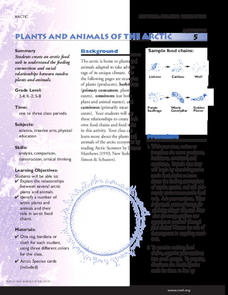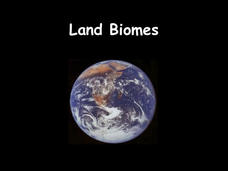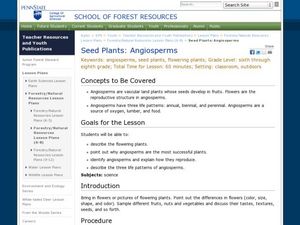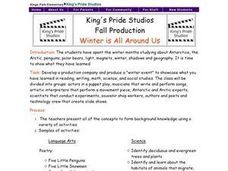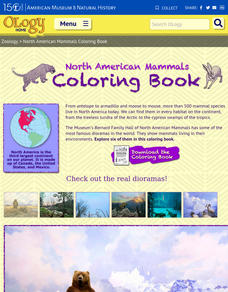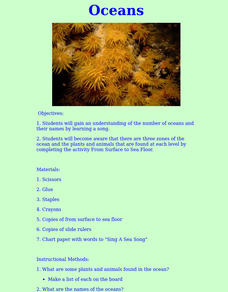World Wildlife Fund
Arctic Food Chain
Explore the food chains that support Arctic ecosystems. A class discussion on interdependence and the different roles plants and animals play in ecosystems provides students with the knowledge to complete a worksheet asking them to...
National Wildlife Federation
Plants and Animals of the Arctic
The Arctic food web may be more limited than other environments, but it has all the same components. With an interactive activity, pupils assume the roles of the components of an Arctic food chain. They move around and link themselves to...
Curated OER
Wild Arctic
Students explore key terms, including food web and food chain. They discuss Arctic plants and animals, devise at least three Arctic food chains and create a food web showing connections among Arctic life.
World Wildlife Fund
Land of the Midnight Sun
From days of 24 hour sunlight, to endless nights that last for days, the Arctic is a very unique place to live. Examine the seasonal changes that occur in the northern-most reaches of the globe and the impact they have on the plants and...
Biology Junction
Land Biomes
Biomes share similar climates and ecosystems, despite being separated geographically on the planet. A presentation introduces the six most common land biomes. It focuses on the commonalities in climate, plants, and animals with many...
Curated OER
Animals of the Arctic
Sixth graders research an Arctic animal. They survey the questions in the Animal Report in order to conduct their research. They investigate their chosen animal by using the Internet, library books and reference books.
Curated OER
Seed Plants: Angiosperms
Middle schoolers describe flowering plants and see why angiosperms are the most successful plants. In this angiosperms instructional activity students identify angiosperms and explain how they reproduce.
Curated OER
Fitting In-Animals' Adaptations to Their Environment
In this animals' adaptation to their environment worksheet, students read for comprehension and ability to apply knowledge. In this T-Chart and creative activities worksheet, students answer three questions.
Curated OER
Exploring Regions of Our World
Examine how climate and landforms affect plants and animals that live in particular areas. Discover that these same factors affect peoples' homes, jobs, and recreational activities. Pupils research ecosystems and biomes, and then write...
Curated OER
Build the Arctic Tundra
Students build a model of biome in order to comprehend the abiotic and biotic factors that are prevalent in a biome. In this hands on building lesson, students use a box to build a biome. . Students decorate the inside and outside of...
Curated OER
In Arctic Waters
In this reading comprehension and following directions worksheet, students read facts about Arctic waters, the Inuit, Arctic animal adaptations, polar bears, walruses, seals, narwhal, Beluga whales and create a mix-and-match animal...
Curated OER
Who Lives in the Arctic North?
Young scholars study the Arctic North. In this Canada history lesson, small groups of students research and then teach the class about either the plants, animals, humans, or geography in relation to the Arctic North. Young scholars make...
Curated OER
Winter is All Around Us
Students present what they have learned on Antartica. Students identify deciduous and evergreen trees and plants; identify and study about the habitats of animals that migrate, hibernate, and adapt; study the Aurora and Aurora Borealis...
Curated OER
Animals and Their Biomes
Students categorize animals according to their natural biomes using biome and animal flashcards.
Curated OER
Whose Home Is This?
After reading a short and informative paragraph on animals and their environments, learners look at pictures of four animals, and write a short description of how each one has adapted to its environment. A suggested activity is that each...
American Museum of Natural History
North American Mammals Coloring Book
Seven pages offer scholars the opportunity to learn about North American mammals and boost their coloring skills. Animals include brown bears, beavers, jackrabbits, wolves, jaguar, and Dall sheep
Curated OER
Oceans
Students gain an understanding of the number of oceans and their names by learning a song. They become aware that there are three zones of the ocean and explore the plants and animals that are found at each level.
Curated OER
A Walk in the Tundra
Discuss the environment of the Arctic tundra using this resource. The focus of this lesson is the story A Walk in the Tundra by Rebecca L. Johnson. The appealing illustrations are bound to captivate your class! After reading the story,...
Curated OER
Arctic Food Web
Students research animals found in the arctic. They discuss what living things need in order to survive and where they get their food. Students discuss the difference between producers and consumers and create a food web for animals in...
Curated OER
Arctic Peoples
In this world history worksheet, students utilize a word bank of 10 terms or phrases to answer 10 fill in the blank questions about Arctic peoples. A short answer question is included as well.
Curated OER
Biomes Internet Lesson
In this biomes worksheet, students use an on line source to complete a table of the Earth's biomes. Students include the types of plants in each biome, the types of animals, the climate and any details about the biomes. Students answer...
Curated OER
Arctic Microclimates
Students identify, measure, and average micro-climatic temperatures in a particular region. They draw a small-scale map of an area to be sampled (classroom, playground, park, backyard) and identify potential locations for...
Curated OER
Polar Bear Needs a Home!
Third graders are introduced to the topic of habitat . They create a zoo exhibit fo a polar bear that is being donated to the Albuquerque Zoo. The zoo is not big enough for a brand new cage, so the students choose which of three...
Curated OER
Climate Watch
Pupils participate in a national survey of biological indicators of climate change by gathering and submitting data on local plants and animals.



